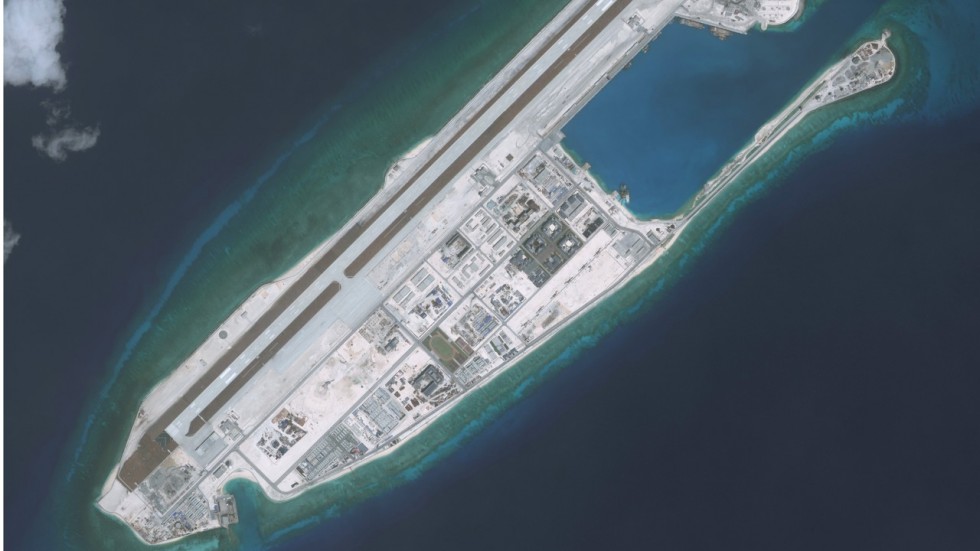Tackling South China Sea
May 21, 2018 | Expert Insights

Philippines has stated it has “serious concerns” regarding China and the South China Sea. The country’s government has noted that it is particularly worried about China’s strategic bombers in the region and that it has taken “appropriate diplomatic action” as a result.
Background
The South China Sea is at the heart of a land and water dispute between China, the United States, and many Southeast Asian nations. China’s claim to the region is historic going back to the Xia and Han dynasties. The US has maintained that region as part of the international waters. Other countries that are involved in the South China Sea dispute include Malaysia, Indonesia, the Philippines, and Vietnam.
One of the reasons why the South China Sea is so vital to these countries is due to the strategic advantage it provides. If China had complete control of the region, then it would be able to control a major trade route. It would be able to disrupt trade shipments that pass through this region to East and Southeast Asia. Currently, US$5.3 trillion worth of trade passes through the South China Sea.
In the past, China has backed its expansive claims with island-building and naval patrols. The United States says it does not take sides in territorial disputes but has sent military ships and planes near disputed islands, calling them “freedom of navigation” operations to ensure access to key shipping and air routes.
South China Sea’s strategic position is not the only reason why the nations are battling for control over the region. Natural gas reserves that exist in the region are estimated to total around 7,500 km³ (266 trillion cubic feet). Reed Bank, which is situated near the coast of the Philippines, is believed to hold large reserves of oil and natural gas. The region also holds reserves of minerals such as titaniferous magnetite, zircon, monazite, tin, gold, and chromite.
Analysis
China has built seven islands on reefs in disputed areas of the South China Sea. Experts have noted that three of these islands have the capabilities for accommodating fighter jets.
In the past, Philippine President Rodrigo Duterte has courted China and avoided rows over maritime sovereignty that dogged his predecessors. He has also criticized and berated their traditional ally, the United States, over several issues.
Now, the Philippines has revealed that it has taken “appropriate” diplomatic action as it had “serious concerns” regarding China’s strategic bombers in the South China Sea. Reports had emerged last week that China’s bombers such as H-6K had landed on and taken off from some of the islands and reefs that are part of South China Sea. In retaliation, the US had also sent across its own ships to the area. Even though Philippines stated that it had not been able to verify the presence of Chinese bombers independently, it was still concerned. Presidential spokesman Harry Roque said, “But, we take note of the reports that appeared and we express our serious concerns anew on its impact to efforts to maintain peace and stability in the region.”
The statement also included, “We are taking the appropriate diplomatic action necessary to protect our claims and will continue to do so in the future. We reiterate our commitment to protect every single inch of our territory and areas which we have sovereign rights over.”
However, despite the statement from the government, Duterte himself has signalled that the nation did not have the military prowess to take on China nor stop its activities in South China Sea. He reacted to reports noting, “You know they have the planes, not stationed in Spratly [Islands] but near the provinces facing … Chinese provinces facing the Spratly and the China Sea. And with their hypersonic, they can reach Manila within seven to 10 minutes. What will we arm ourselves with if there’s a war? Will we resort to slapping each other? I couldn’t even buy myself a rifle. It was given to me. So how will we even fight with the Chinese?”
Assessment
Our assessment is that the militarisation of the South China Sea might threaten to further de-stabilize the region. The latest developments also indicate that many of the smaller nations like Philippines that are involved in the dispute, do not have the resources to continue countering China. It is possible that given Duterte’s acrimony towards the US, he might broach a joint exploration pact with China. This would further complicate the nature of the dispute








Comments